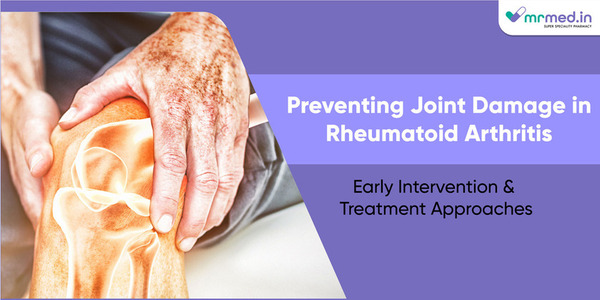Countless people globally endure the challenges of rheumatoid arthritis, a persistent inflammatory condition leading to pain, swelling, and joint issues. Rheumatoid arthritis is an auto-immune disorder that causes chronic inflammation affecting many joints, including hands and feet. It is one of the crippling diseases that severely affects the overall health of the patients causing chronic joint pains throughout their life. Disease-modifying antirheumatic medications (DMARDs), biologics, and nonsteroidal anti-inflammatory medicines (NSAIDs) are the traditional methods of managing rheumatoid arthritis.
Symptoms of Rheumatoid Arthritis
- Joint pain: Pain lasts for six weeks or more, along with swelling and stiffness
- Stiffness: Patients may experience a morning stiffness in various joints that lasts for 30 minutes or more than that.
- Fatigue: It causes tiredness or lack of energy
Preventing joint damage in rheumatoid arthritis
The management of rheumatoid arthritis includes early intervention with proper diagnostic methods such as clinical evaluation of blood tests to identify rheumatoid factor and imaging techniques using X-rays and DEXA scans to identify the damage of joints.
Anti rheumatoid Medications
1. Nonsteroidal Anti-inflammatory Drugs (NSAIDs):
These medications are involved in reducing and alleviating joint swelling, pain, and inflammation. Medications like ibuprofen, naproxen, and celecoxib effectively reduce the joint pain of RA. However, these medicines can cause long-term side effects (kidney and eye damage) in individuals.
2. Disease-modifying Antirheumatic Drugs (DMARDs):
DMARDs are a group of medicines used in RA to slow down disease progression and manage symptoms. They are immunosuppressive and immunomodulatory agents which reduce the immune response during RA. Certain medications like Tofajak tablets contain the active ingredient tofacitinib, which is actively used as arthritis medicine to treat patients and help relieve their joint pain.
3. Analgesics:
They are also known as painkillers, which help to manage joint pain in patients. Medicines like paracetamol or a combination of paracetamol and codeine (co-codamol) are usually used to treat pain in RA.
4. Corticosteroids:
They help to relieve joint pain and inflammation in rheumatoid arthritis patients. It can be used in combination with disease-modifying antirheumatic medications (DMARDs) in RA patients.
Therapies and Approaches
1. Physiotherapy:
Physiotherapy is a holistic therapy that helps restore movement and function in RA patients with muscle joint stiffness. It includes cold/hot applications, electrical stimulation, hydrotherapy, and spa therapy.
2. Occupational Therapy:
They are given by trained professionals (occupational therapists) to support the patients to overcome the barriers that affect them to do their daily activities due to the symptoms of RA.
3. Heat and Cold Therapy:
It is often used as an adjunctive therapy in the treatment of RA by rehabilitation specialists. Applying heat or cold by using heating pads or ice packs in the affected area can help alleviate rheumatoid pain and reduce inflammation.
4. Joint Protection Techniques:
Protecting your joints and bones from stressful movements like falling, lifting heavy weights, and doing aggressive activities is important. This can be achieved by several assisting devices like jar openers, kneelers, lightweight hoses for gardening, and book stands for hands-free reading.
5. Weight Management:
Maintaining an ideal weight can reduce the stress on joints. Eating a balanced diet contributes to weight management and the individual's overall well-being.
Dietary approaches
1. Food to include:
It is recommended to incorporate foods like fish, olive oil, beans, turmeric, berries, ginger, and broccoli, which can help alleviate rheumatoid arthritis symptoms in patients.
2. Food to avoid:
Foods like red meat, fried foods, fast foods, dairy, processed foods, salt, and sugar can worsen RA symptoms in patients. So, it is advised to avoid highly processed foods during rheumatoid arthritis.
Conclusion
Rheumatoid arthritis can cause severe, unbearable pain in patients. Medicines like painkillers or corticosteroids help manage RA-related symptoms. However, it is important to note that it may cause some chronic side effects, which you need to discuss with a doctor. It is important to engage with your healthcare provider to get a tailored treatment for managing rheumatoid arthritis.




